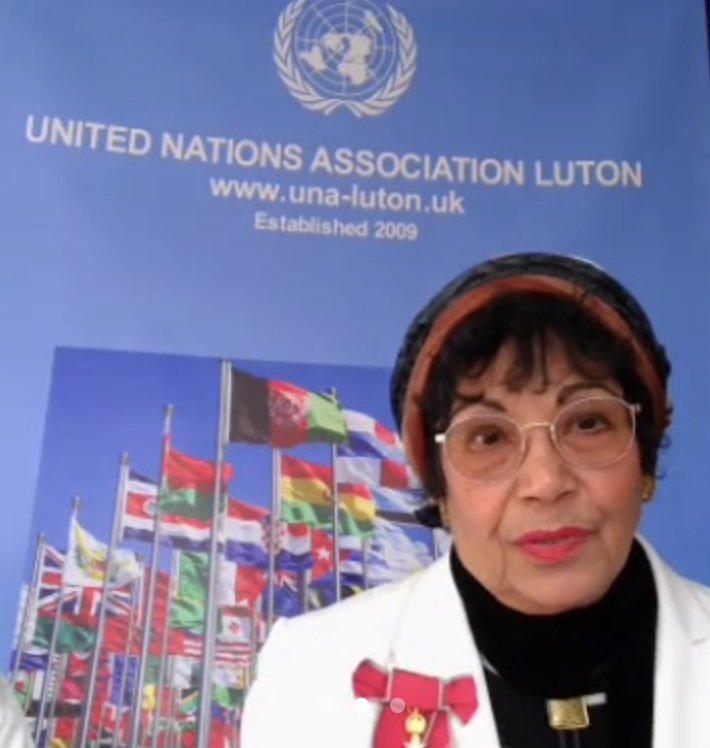United Nations Association (UNA) Luton Branch and Purbachal-the eastern sky, a Bangladeshi voluntary cultural organisation, invited people to celebrate International Mother Language Day on Sunday 26 February 2023. The date was chosen for convenience - the actual UN date is 21st February.
To mark this important international day, and to encourage respect for diverse heritages, histories, cultures, identities and community cohesion, there were songs, dances, poetry-reading and statements in numerous mother-tongues to unite people across communities.
In her Inaugural address, Susan Lousada, HM Lord-Lieutenant of Bedfordshire said;
“The world has over 7,000 living languages with around 150 different languages spoken in Luton alone. Many languages are disappearing or being discriminated against. Each time a language disappears, it takes with it an entire cultural and intellectual heritage.”
“We are very fortunate that an opportunity has been created in Luton, not only to promote linguistic and cultural diversity, but also to remember those who continue to make sacrifices in order that their languages may be preserved.”
“By coming together today, I applaud your commitment to positively demonstrating that we must value diversity and promote peace by respecting and embracing our differences and by learning from each other.”
In her Welcome Address, Dr. Nazia Khanum OBE DL, Chair of UNA-Luton & Purbachal-the eastern sky said: “21st February is one of the most significant dates in the Bangladeshi national Calendar and for the Bangladeshi diaspora across the world. On this day and the following day in 1952 the shooting, killing, wounding and arrest of many young people in Dhaka, the then Capital of East Pakistan, changed our history forever. Their crime was to demand that Bangla, the mother tongue of the East Pakistanis, should be recognised as the state language of Pakistan. They came out on the streets in violation of the ban imposed by the then provincial government against any large gathering. These incidents led to a powerful mass movement across East Pakistan, compelling the government to recognise Bangla as one of the two state languages of Pakistan - ie Bengali and Urdu.”
“The Language Movement of the 1950s inspired and infused Bengali speakers with the courage to stand up against the blatant social, economic, and political subjugation of the majority by the minority since the creation of Pakistan in 1947. Within 24 years of the creation of Pakistan, Bangladesh emerged as an independent country. This time the price we paid was much higher. It was a genocide of Bengali speakers, the annihilation of our intelligentsia, our students, and destruction of our infrastructure. But we won the war in 1971. In both our language movement and in the war of independence, the courage that the Bengali speakers showed was unique. There is no other example in history where people faced bullets, beating, wounding and imprisonment to achieve the rightful status of their Mother Language.”
“Since UNESCO’s declaration in November 1999 of 21st February as International Mother Language Day, we have been inclusive of other linguistic groups in our programmes. We believe in sustainable community cohesion and peace. Celebrating mother languages together can contribute to comradery – a much better appreciation of diverse cultural identities, wisdom, peace, and sustainable community cohesion. This also comes with a sense of responsibility to raise awareness among other communities of our own history of sacrifice and achievement. Today, we feel a strong sense of solidarity with the brave Ukrainians who are fighting to save their country and their cultural identity against a brutal invading superpower which does not recognise Ukraine’s cultural and national identity, freedom, and independence.” To read her full address, please click here.
David Jonathan Director, GRASSROOTS, Luton Council of Faiths & Near Neighbours Programme was also invited to contribute a reading in Hindi language, which is his mother tongue. He recited the following poetry, written by an Indian poet named Jaidev. It is written in the form of a prayer.
ईश्वर अल्लाह तेरो नाम, सबको सन्मति दे भगवान
Be it God, be it Allah – all are your names. Bless everyone with wisdom, accord, consent & harmony
माँगों का सिन्दूर ना छूटे माँ बहनो की आस ना टूटे
देह बिना भटके ना प्राण सबको सन्मति दे भगवान
ईश्वरअल्लाहतेरोनाम, सबकोसन्मतिदेभगवान
May the vermilion (which is the bright-red dye traditionally worn in the hair by married women in India & in South Asia), so may the vermilion in women’s hair, never be wiped off (In other words, may no woman become a widow due to the mindless violence in our world. May the hopes & dreams never diminish, particularly of our mothers and sisters whose survival depends on the men in their families. May no human lives be lost in vain.
Be it God, be it Allah – all are your names. Bless everyone with wisdom, accord, consent & harmony
ओ सारे जग के रखवाले निर्बल को बल देने वाले
बलवानो को देदे ज्ञान सबको सन्मति दे भगवान
ईश्वर अल्लाह तेरो नाम, सबको सन्मति दे भगवान
Oh the creator and the protector of the world, strengthen and empower those who are weak & vulnerable and grant knowledge and wisdom, understanding and discernment to those in power, so we can all work for the common good.
Be it God, be it Allah – all are your names. Bless everyone with wisdom, accord, consent & harmony.
Dr. Nazia Khanum OBE DL, Chair of UNA-Luton & Purbachal-the eastern sky giving the Welcome Address at International Mother Language Day event held online on Sunday 26 February 2023.

